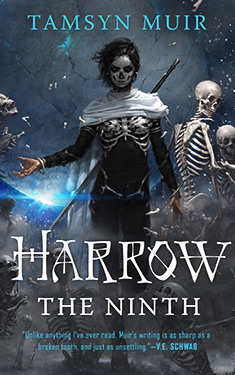Tamsyn Muir
Completed 6/18/2021, Reviewed 6/18/2021
1 star
This book was a mess. It maybe was trying to be clever in form, but it was simply a mess. About halfway through, I was ready to give up and put it down, but I read a bunch of reviews that said that the first two-thirds of the book are confusing and it all comes together in the end. I also read a few that hated the whole book. I should have listened to those few. This book has a lot of fans and has very high ratings on several book sites. I’m not one of them. By the time I got to the part that was supposed to be revelatory, I didn’t care. As with Muir’s first book, Gideon the Ninth, I’m astounded this book has been nominated for awards, including the Hugo. The Hugo being a fan-based award, tells you how loved it is. Amazing.
I’m not sure I can convey the plot because I’m not sure what it was. The summary says something about Harrow going on a spaceship that’s haunted by the ghost of a planet, as well as ghosts of dead peers. Someone one wants her dead, and she doesn’t know if the universe is better off with her or without her. I really didn’t get that. I don’t really know what I got. The book is non-linear, jumping all over the timeline. I ended up reading the chapters as 50 some-odd short stories that may or may not have been related to past stories. I kinda could follow a couple of the story lines, but there didn’t seem to be much plot there. Harrow is obsessed with the dead thing in the Locked Tomb back on her home planet. Yeah, someone is trying to kill her. People around her are getting killed, and their ghosts or more accurately revenants are coming back and interacting with her.
The book is written mostly in second person, with occasional chapters in third person. The second person narrative actually read fairly well, not as bad as others I’ve read. I’m not a fan of second person, it seems more like an academic exercise rather than legitimate storytelling device. But when you get past that two-thirds point in the book, it becomes clear who the narrator is.
The characterization is a little better in this book than in “Gideon”. Despite there being way too many characters again, a few stood out with major roles. Augustine, Mercymorn, the Emperor aka God, and of course Harrow. However, I though Harrow was so very different than she was in Gideon, it was hard to connect the original with this instance of her. My biggest complaint that there are so many ways to refer to a character, it was almost like a Russian novel: cavalier, saint, lyctor, their name, meat.
The prose was interesting as well. Normally, I would have said it was good, but I found it just complicated and diffused comprehension. Sometimes the descriptions and similes went on so long, I lost track of conversations, which is a cardinal sin of prose, particularly when there are many people speaking.
Like it’s predecessor, I give this book one star out of five. I’m not necessarily a fan of non-linear books, but this one was simply incomprehensible. I don’t know why lately I’ve become obsessed with reading Hugo and Nebula nominees. I don’t vote (but maybe I should register to vote this year for the Hugos, which are being delayed until December). I guess I want to see what all the fuss is about the nominees. And these popular books are almost always on sale, so I buy them. However, whether the third book in this trilogy is nominated next year or not, I’m definitely not buying or reading it.

No comments:
Post a Comment